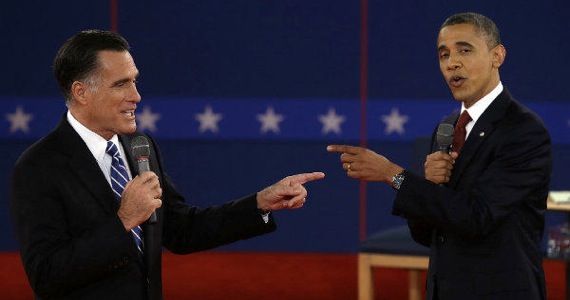I'll admit it: I'm a big fan of the Presidential Debates (and even the Vice-Presidential Debate). If it's happening, I'll be there, watching it on television and following along with commentary on the Internet - Twitter, where people are funnier and faster than you, and you can steal their lines and impress your non-Internet-obsessed friends nonetheless - and so, of course, I'm ecstatic that I have my choice of networks and channels to choose from when it comes to tuning in. And yet, at the same time, part of me wonders: Whatever happened to counter-programming?
The three debates so far - and the final one, this upcoming Monday - have been broadcast live not only on C-Span, PBS, CNN, Fox News and MSNBC as you might expect, but also ABC, CBS, Fox and NBC. Which, on the one hand, is a wonderful sign that the broadcast networks are willing to set aside ratings concerns when it comes to important events like the future of the country and all, but on the other hand, what are they doing? After all, it's not as if the debates will be different on each of these channels, so the idea that the coverage on ABC is in any way better, worse or not exactly the same thing from the coverage on NBC is an entirely ludicrous one. So why do the networks all pre-empt their new fall schedules just weeks in to ensure that you have as much choice as possible?
It may be that the debates do draw such interest that all of the networks just assume that they've got a fair shot at grabbing some reasonable number of viewers, and that if they play their cards right, those viewers will stick around to watch whatever shows are on afterwards (A ploy that may not work so well on the West Coast, where the shows following are likely to be re-runs of primetime shows, thanks to the time difference). After all, almost sixty-six million people watched Tuesday's debate, and even when that number is split amongst the twelve channels that carried it, that's pretty impressive (Interestingly enough, Neilsen doesn't release ratings for the networks during a debate, because there were no commercials aired during it; strange but true).
Of course, maybe the idea of counter-programming is a myth; the CW, which aired regular programming against the debates had a lower-than-anticipated premiere for its new show Emily Owens MD Tuesday, while Hart of Dixie's audience was essentially the same as it had been the week before. Similarly, on cable, there weren't any massive gains for any shows in the wake of them offering a respite from political talking heads; the most-watched cable show of the night on Tuesday (Sons of Anarchy) actually dropped viewers when shown against the debate.
And yet, I can't help but feel as if there is an audience out there who doesn't want to watch the debate, and would like an alternative, instead. Am I imagining that, or are those people just choosing to abandon live television entirely for the night, and running to Netflix, TiVo or - gasp - doing something that isn't watching television at all, instead? I'm really curious; if you've been avoiding the debates, tell us what you did with that time instead, considering that regular television has been pretty much suspended for the duration.

